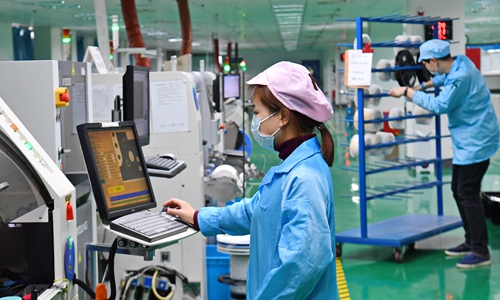SOURCE / INDUSTRIES
Chinese companies stabilize global supply chain despite virus
Chinese companies stabilize global supply chain, win overseas appreciation

Workers are busy at SY Science & Technology, a technology company in Shaoxing, East China's Zhejiang Province on March 2. To secure export supplies, the company's return-to-work rate has reached 92 percent as of the end of February. Since the first batch of exports were delivered after work resumption began on February 12, it has delivered more than 50 batches of goods to overseas clients.
Days after Chinese company Xinbao shipped out a batch of OEM products including coffee machines and ice makers in February, it received a thank-you letter from General Electric Company (GE), praising its on-time delivery.
As one of the world's largest manufacturers of household appliances, Xinbao Electrical Appliances Holdings Co in Foshan, South China's Guangdong Province, occupies a 10 percent share in the global market, while its star product, coffee machines, could hit 40 percent in the global market. Its early resumption weighs a lot in the global supply of household appliances.
As the global market shows a sign of worry that China-made products may not be able to meet global demands amid the coronavirus outbreak, the Chinese government and local companies are stepping up efforts to perish this thought.
"Many overseas clients are anxious, and they have been contacting us frequently to get information on resumption of production," said Ray Zeng, chairman of the company.
Due to the outbreak of the novel coronavirus pneumonia, millions of Chinese workers returning to their hometowns had to extend the weeklong Spring Festival holidays, and many factories and businesses did not restart until February 10 or even later.
"Collecting staff's information, sending charter buses to take employees back to work and seeking help from other suppliers, are what we are doing to fulfill clients' orders despite the virus," Zeng said.
The company's honest move won not only a letter of thanks from its American business partners, but also brought it more orders.
"We have received more overseas orders in the following two months compared with last year, and the new orders are scheduled to be fulfilled in May," said Zeng. "We are now managing to restore our capacity and recoup losses in February."
Xinbao is just an epitome of China's move to deal with severe challenges posed by the deadly virus and maintain the stability of the global supply chain.
China is implementing targeted policies and taking solid actions to ensure epidemic prevention while resuming production to meet global supply.
Galanz Enterprises Co, another Foshan-based company, a major microwave producer, has promised to never delay or call off delivery amid the epidemic.
"No matter how difficult it is, the delivery has to be conducted because we shall be responsible for all the clients," said Liang Zhaoxian, the chairman of Galanz.
To honor its promise, the company resumed production on February 10 after taking a series of unprecedented strict prevention measures including temperature checks at least twice a day and washing hands six times a day.
According to the chairman, to further deal with the shortage of line workers, the company has mobilized more than 160 managerial staff to work on the production line.
"For the time being, the production efficiency has increased by 30 percent compared to the early start of the resumption, and daily capacity is expected to go back to normal soon," said Li Feng, vice chairman of the company, who also serves as stand-by line staff amid the epidemic.
Apart from being honest and efficient, Chinese companies have also been highly flexible and adaptive when facing the coronavirus crisis.
As the world's largest producer of plastic air conditioner vanes, Foshan-based Guangdong Sunwill Precision Plastic Co exports about 30 million sets every year, accounting for one-third of the global share.
According to Mo Qiyan, the chairman of the company, after the suspension of the branch company in Wuhan, the epicenter of the virus, the company has relocated production materials and accessories to other offices to ensure production and delivery.
"Instead of increasing the ex-factory price due to the epidemic, we finished our deliveries without considering the loss," Mo said. "What surprised us is that we actually received more global orders this year."
For Mo, the virus is not just a threat or a crisis, but also a test to China's supply chain and Chinese companies' ability to survive the risk.
Mo said that the shortage of labor amid the epidemic activates more Chinese enterprises to focus on further industry upgrading.
Mo's company has now invested more than 40 million yuan ($5.72 million) in automation equipment, and the workforce is expected to drop by 1,000 without reducing the capacity.
"As more Chinese companies improve intelligent manufacturing, we will strengthen the ability to withstand the risks," Mo said.
